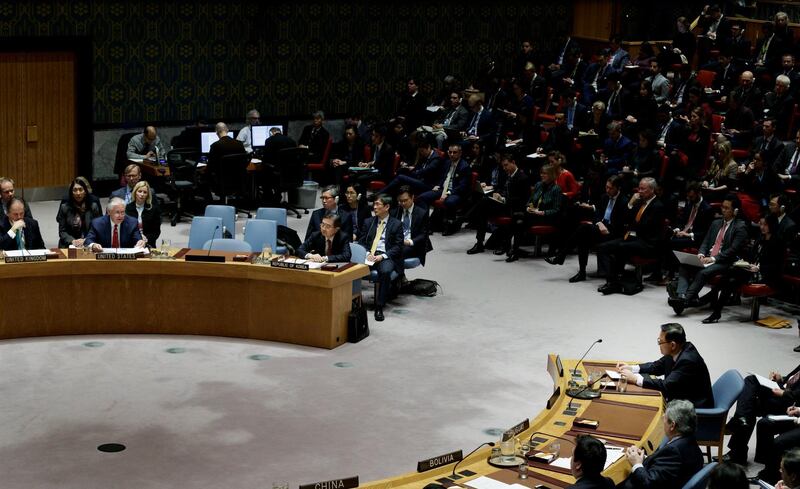North Korea’s friends and enemies joined forces Friday in opposing its determination to be recognised as a nuclear weapons state and calling on leader Kim Jong Un to negotiate the denuclearisation of the Korean Peninsula — but the North gave no sign of budging on its ambitions.
In a very rare appearance by a North Korean at the United Nations Security Council, ambassador Ja Song Nam told a ministerial meeting that the country’s possession of nuclear weapons was “an inevitable self-defensive measure” to defend the country against “the US nuclear threat and blackmail.”
Mr Ja never mentioned the possibility of talks. Instead, he called the council meeting “a desperate measure plotted by the US being terrified by the incredible might of our republic that has successfully achieved the great historic cause of completing the state nuclear force.”
He pointed to the November 29 launch of an intercontinental ballistic missile, which experts say could reach the US mainland.
South Korea’s vice foreign minister Cho Hyun told the council that North Korea is “in the final stages of nuclear weaponisation” and warned that if it can put a nuclear warhead on an intercontinental ballistic missile “it will fundamentally alter the security landscape in the region and beyond.”
He urged the international community to grasp the urgency of the threat this poses and find ways to halt the North’s nuclear program — including by maximising pressure and uniting in answering “absolutely no” to North Korean attempts to be recognised as a nuclear-weapons state.
US secretary of state Rex Tillerson declared: “We will never accept a nuclear North Korea.”
Earlier this week, Tillerson stunned many by proposing talks with North Korea without preconditions. But he stepped back Friday, after the White House rebutted the proposal, telling the council: “North Korea must earn its way back to the table.”
The US and close allies South Korea and Japan called for increased pressure on the North to get Kim's government to negotiate the denuclearisation of the Korean Peninsula.
North Korea’s Ja said his country has been the target of 11 UN sanctions resolutions. The United States, the European Union, South Korea, Japan and other countries have imposed additional measures. But all these bans haven't stopped Kim’s nuclear and missile tests, or led to negotiations.
Japan's Foreign Minister Taro Kono urged the international community to maximize pressure on North Korea "by all means available," saying there is no other way to get Pyongyang to curb its escalating nuclear and missile programs. He announced that Japan has just ordered the assets of 19 North Korean entities to be frozen.
Mr Kono said last week’s visit to Pyongyang by UN political chief Jeffrey Feltman “only reconfirmed the dire reality” that North Korea “is nowhere near ready” to abandon its nuclear and missile programs, “nor is it interested in returning to a meaningful dialogue.”
Russia’s UN Ambassador Vassily Nebenzia said “military rhetoric accompanied by a test of strength by the participants has led to a situation where around the world people have begun to wonder whether there will be war or not.”
He questioned the U.S. commitment to peace on the Korean peninsula, saying 2 1/2 months of quiet from North Korea was answered by Washington and its allies with unscheduled and unprecedented military exercises in their scale, unilateral sanctions, and a declaration that the North is a state sponsor of terrorism.
“All of these steps force us to wonder about the sincerity of statements that suggest that there is a preference for a peaceful approach to resolving the crisis” by the United States, Nebenzia said.





